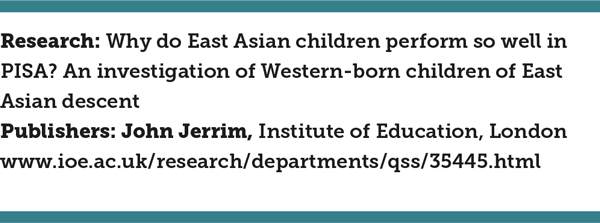
What is the East Asian “secret” to educational success? Tiger parents? Confucian beliefs? Dr John Jerrim’s study on Australian-born pupils of East Asian heritage suggests that there is no straightforward magic formula. In fact, pupils from an “average” school system such as Australia (or the UK) can do just as well as young people in high-performing East Asian countries.
The OECD’s Programme for International Student Assessment, better known as PISA, is like an international league table. The three-yearly exercise produces international education rankings for more than 70 countries/regions based on tests in reading, maths and science taken by more than 500,000 15-year-olds.
The top places are dominated by Asian school systems, such as Shanghai, Singapore and South Korea. UK results have stagnated and remain among the middle-ranking countries in the most recent results from 2012.
British policymakers and educationists have been eager to learn from the success in East Asia and so boost standards in UK schools. Jerrim’s study instead tries to find insights from Australia, which has a similar system to the UK. By analysing Australian PISA maths data from 2012, he explores how second-generation, Australian-born children of East Asian backgrounds do substantially better than their peers, who they outscore by more than 100 PISA test points, equivalent to two-and-a-half years of schooling. The findings also show that these pupils do better than almost everyone else in the world, despite being taught in an average ranking, Western school system.
The study suggests that there is no simple explanation, that it is a combination of inter-linked factors. East Asian heritage pupils tend to attend “better” schools, which significantly contributes to high achievement. This possibly reflects the high value placed on education by East Asian families in Australia, leading parents to select the best possible schools.
Yet, even after accounting for differences in family background and schools, the results from East Asian heritage pupils are still better than their peers. Jerrim suggests that out-of-school factors, such as home environment and culture, also play an important role, as East Asian heritage pupils receive more out-of-school tuition, do more maths-related activities, and have higher aspirations.
The limitations of PISA data for the UK and other countries does not currently allow examination of the results of children of East Asian descent in these societies.
However, looking at what is happening in Australia can be extremely insightful because of its similarities to the British system. The Australian evidence suggests that high achievement can be developed within a non-top ranking system, and that what happens outside school matters a great deal. I agree with Jerrim that the study shows that efforts from schools and teachers alone would not be enough to improve achievement significantly.
It is important to highlight that the analysis cannot draw firm causations. For example, out of high aspirations and high achievement, which comes first? Also, as Jerrim rightly points out, migrants are typically a self-selective group with stronger determination to improve their lives.
It is noteworthy that East Asian parents in the study were more highly educated than the Australian-born parents, but the East Asian parents actually had lower levels of household wealth and were not in more prestigious occupations. A similar pattern was seen for migrants from the Indian region.
The high value placed on education can be linked to East Asian culture, but it can also be a strategy, partially driven by the need to overcome potential barriers in the jobs market. Research on British Chinese shows that the “Chinese value of education” is a way to establish group identity within British society.
Hence, factors are complex and interlinked in and out of school, and more research is needed to help children from all backgrounds to do well.













Your thoughts